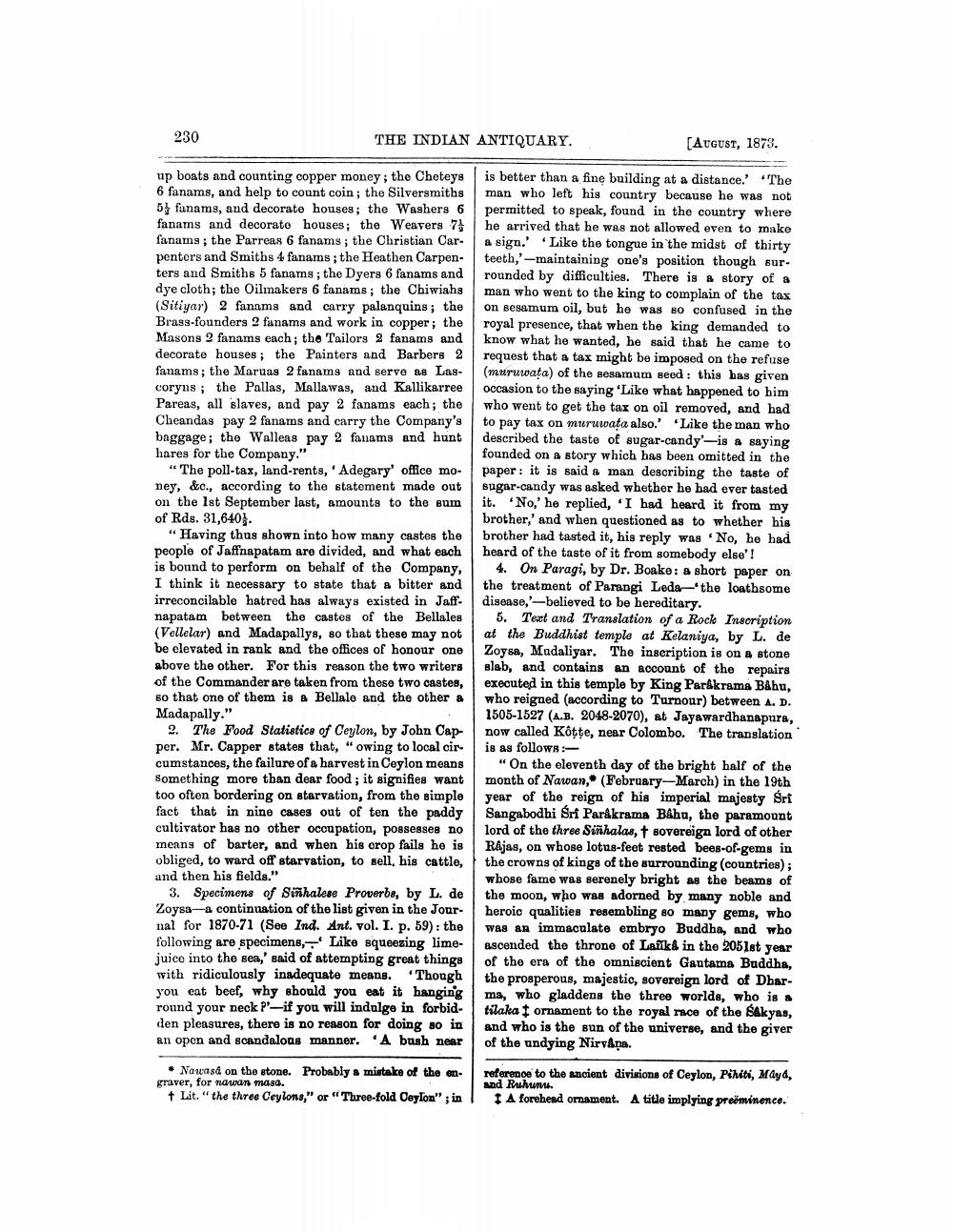________________
230
THE INDIAN ANTIQUARY.
[AUGUST, 1873.
up boats and counting copper money; the Cheteys is better than a fine building at a distance. The 6 fanams, and help to count coin; the Silversmiths man who left his country because he was not 5} fanams, and decorate houses; the Washers 6 permitted to speak, found in the country where fanams and decorato houses; the Weavers 7 he arrived that he was not allowed even to make fanams; the Parreas 6 fanams; the Christian Car- a sign. Like the tongue in the midst of thirty penters and Smiths 4 fanams; the Heathen Carpen- teeth,'-maintaining one's position though sur. ters and Smiths 5 fanams; the Dyers 6 fanams and rounded by difficulties. There is a story of a dye cloth; the Oilmakers 6 fanams; the Chiwiahs man who went to the king to complain of the tax (Sitiyar) 2 fanams and carry palanquins; the on sesamum oil, but he was so confused in the Brass-founders 2 funams and work in copper; the royal presence, that when the king demanded to Masons 2 fanams each; the Tailors 2 fanams and know what he wanted, he said that he came to decorate houses; the Painters and Barbers 2 request that a tax might be imposed on the refuse fanams; the Maruas 2 fanams and serve as Las- (muruwata) of the sesamum seed: this has given coryns; the Pallas, Mallawas, and Kallikarree occasion to the saying 'Like what happened to him Pareas, all slaves, and pay 2 fanams each; the who went to get the tax on oil removed, and had Cheandas pay 2 fanams and carry the Company's to pay tax on muruwata also. Like the man who baggage; tho Walleas pay 2 fanams and hunt described the taste of sugar-candy-is a saying hares for the Company."
founded on a story which has been omitted in the "The poll-tax, land-rents, 'Adegary' office mo- paper: it is said a man describing the taste of ney, &c., according to the statement made out Bugar-candy was asked whether he had ever tasted on the 1st September last, amounts to the sum it. 'No,' he replied, 'I had heard it from my of Rds. 31,640).
brother,' and when questioned as to whether his "Having thus shown into how many castes the brother had tasted it, his reply was 'No, he had people of Jaffnapatam are divided, and what each heard of the taste of it from somebody else'! is bound to perform on behalf of the Company, 4. On Paragi, by Dr. Boake: a short paper on I think it necessary to state that a bitter and the treatment of Parangi Leda—the loathsome irreconcilable hatred has always existed in Jaff disease,'-believed to be hereditary. napatam between the castes of the Bellales 5. Text and Translation of a Rocle Inscription (Vellelar) and Madapallys, so that these may not at the Buddhist temple at Kelaniya, by L. de be elevated in rank and the offices of honour one Zoysa, Madaliyar. The inscription is on a stone above the other. For this reason the two writers slab, and contains an account of the repairs of the Commander are taken from these two castes, executed in this temple by King Par&krama Bøhu, so that one of them is a Bellale and the other a who reigned (according to Turnour) between A. D. Madapally."
1505-1527 (A.B. 2048-2070), at Jayawardhanapura, 2. The Food Statistics of Ceylon, by John Cap- now called Kotte, near Colombo. The translation per. Mr. Capper states that, "owing to local cir. is as follows: cumstances, the failure of a harvest in Coylon means "On the eleventh day of the bright half of the Something more than dear food; it signifies want month of Nawan, (February-March) in the 19th too often bordering on starvation, from the simple year of the reign of his imperial majesty Sri fact that in nine cases out of ten the paddy Sangabodhi Sri Paråkrama Bahu, the paramount cultivator has no other occupation, possesses no lord of the three Siñhalas, † sovereign lord of other means of barter, and when his crop fails he is Rajas, on whose lotus-feet rested bees-of-gems in obliged, to ward off starvation, to sell, his cattle, the crowns of kings of the surrounding (countries); and then his fields."
whose fame was serenely bright as the beams of 3. Specimens of Sinhalese Proverbs, by L. de the moon, who was adorned by many noble and Zoysa---a continuation of the list given in the Jour- heroic qualities resembling so many gems, who nal for 1870-71 (See Ind. Ant. vol. I. p. 59): the was an immaculate embryo Buddha, and who following are specimens, Like squeezing lime- ascended the throne of Lafike in the 2051st year juice into the sea,' said of attempting great things of the era of the omniscient Gautama Buddha, with ridiculously inadequate means. Though the prosperous, majestic, sovereign lord of Dharyou eat beef, why should you eat it hanging ma, who gladdens the three worlds, who is round your neck P-if you will indulge in forbid-1
tilaka ornament to the royal race of the Sakyas, den pleasures, there is no reason for doing so in and who is the sun of the universe, and the giver an open and scandalous manner. A bush near of the undying Nirvana.
• Nawask on the stone. Probably s mistake of the engraver, for naman masa.
+ Lit. " the three Ceylons," or "Three-fold Ceylon”; in
reference to the ancient divisions of Ceylon, Pihiti, Maya, and Rom .
forehead ornament. A title implying preöminence.




